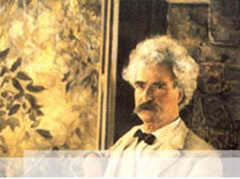语音讲解:
课文朗读:

Before becoming one of America's greatest writers, Mark Twain was a reporter, a gold digger and a soldier. But it was his experience on the Mississippi River that had the greatest influence on him and his writing.
In piloting a riverboat, Twain learned to read the river like a book. Things that once seemed unimportant became full of meaning. A beautiful sunset might mean that there would be windy weather the next day; floating logs often were warnings that the river was rising; and any slanting mark could mean that a dangerous reef was just below the water's surface.
This knowledge of the river was helpful, but it had its price. Twain's experience on the muddy Mississippi cost him his innocence. After years as a riverboat pilot, he sadly said that, "All the grace, the beauty, the poetry, had gone out of the majestic river."to be continued...
词汇小补帖:
●muddy浑浊的
●gold digger淘金者
●pilot驾驶
●slanting mark倾斜的痕迹
●grace优雅
●majestic庄严的
●reporter记者
●soldier军人
●floating log浮木
●reef暗礁
●poetry诗意
英语小教室
马克-吐温(Mark Twain)的原名是Samuel Langhorne Clemens,他笔名的(pen name)意思是表示水浅危险,不能行船。马克-吐温凭着年轻时驾驶河船的经验,写成了脍炙人口的自传(autobiography)《密西西比河上的生活》(Life on the Mississippi)。以幽默嘲讽(humorous and ironic)风格著称的马克-吐温,在书中呈现温暖的追忆和淡淡的忧愁。他感叹到,原本美好的河上风光、美丽的夕阳,在他学会开汽船后,都变了色,变了调。就好像一个医生,在看到女孩子脸上的红晕时,还以为是发烧。马克-吐温为失去的童真感到哀伤。
| 
![]() 本网站由北京信息港提供网络支持
本网站由北京信息港提供网络支持
